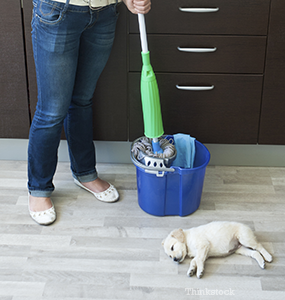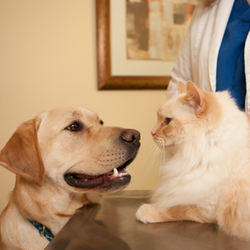Posts by:
Dr. Justine Lee‘s talks about certain household cleaners that are particularly dangerous for pets. For more from Dr. Lee, find her on Facebook!
Today we’re going to talk about certain “spring cleaning” products that are very dangerous to pets. Now, keep in mind that most household surface cleaning products only result in minor clinical signs of vomiting and diarrhea; these are products that you typically spray on windows and kitchen counters to wipe them down.

However, there are certain cleaning products in your house can be really dangerous to dogs and cats. Products that pose the biggest corrosive or caustic danger threat are:
- Drain cleaners
- Pool chemicals
- Concentrated dishwashing chemicals
- Lime-removal products
- Oven cleaners
- Concentrated toilet cleaners
My general guideline on how to differentiate safer versus more dangerous household cleaners is this: items that smell really bad are typically pretty dangerous. My second tip? If you see the words “CAUTION” versus “DANGER” on the bottle; the word “DANGER” typically means the product is corrosive or caustic, and can cause severe injury to you and your pet.
Corrosive or caustic products can cause chemical burns when ingested or when accidentally exposed to the fur and skin. If your dog or cat is accidentally exposed to these chemicals, it requires immediate first aid care at home and a visit to your veterinarian right away.
- Clinical signs of corrosive or caustic injury include:
- Red, raw skin
- Blistering of the skin
- Pain
- Pawing at the mouth
- Severe drooling
- Not eating
- Fever
- Pawing at the eyes
- Tearing of the eyes
- Lethargy or malaise
Untreated, it can result in severe tissue damage (like rupturing the esophagus or stomach!) or even death.
So, what do you do if your dog or cat accidentally is exposed to a corrosive or caustic substance?
- First, safely get your pet to a safe area (to prevent them from ingesting more!).
- Carefully gather the container or substance to bring to the veterinary hospital or to describe to the veterinarian (protect yourself by using gloves).
- Contact your veterinarian for further immediate recommendations.
- If the product was ingested or chewed on, flush your pet’s mouth out with tap water, making sure that they don’t choke on it or inhale it. You can use a turkey baster or even a kitchen sink hose; however, never stick the house down your pet’s throat or mouth, as they can choke on this. Make sure your dog’s nose is pointed down towards the ground to prevent excess water from being swallowed or inhaled. Attempt to flush for 10-15 minutes.
- Once you begin these steps, seek immediate veterinary attention.
If there was dermal exposure of a corrosive or caustic substance (e.g., onto the skin or fur):
- Liberally flush the affected area with water, using protective gloves or gear to keep you safe.
- Safely gather the container or substance to bring to the veterinary hospital or to describe to the veterinarian.
- Apply a generous amount of sterile lubricant (such as KY® Jelly), but do not apply any chemicals or neutralizing agents!
- Loosely cover the wound with gauze or a bandage.
- Seek immediate veterinary attention.
When in doubt, keep these dangerous cleaning chemicals out of reach of your pets (and kids!). Use childproof locks and make sure to lock your pets OUT of the area when you are cleaning.
If you have any questions or concerns, you should always visit or call your veterinarian – they are your best resource to ensure the health and well-being of your pets.
